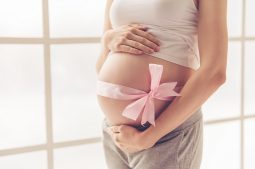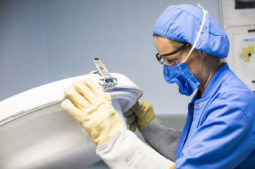An ectopic pregnancy occurs when a fertilised egg becomes lodged outside the uterus, usually in one of the fallopian tubes. In this article we review what are the possible causes, what are the signs and how you might recognise any ectopic pregnancy symptoms, how the condition is diagnosed and finally ectopic pregnancy treatment.
Although ectopic pregnancies normally can be treated without any long-term damage, it is not possible to save the pregnancy. People who experience this will, as a result, experience not only the physical symptoms of ectopic pregnancy pain but also the same feelings of loss and grief as if they had suffered a miscarriage. Medical advice is therefore to give yourself and your partner time to recover before trying again.
What is an ectopic pregnancy?
It is a pregnancy that happens outside of your uterus. This occurs when a fertilized egg implants in a location that can’t support its growth.
Where does it happen?
An ectopic pregnancy most often happens in your fallopian tube (a structure that connects your ovaries and uterus). They can more rarely occur in your ovary, abdominal cavity or cervix. Pregnancies can’t continue if they’re ectopic because only your uterus is meant to carry a pregnancy.
Ectopic pregnancies can become life-threatening, especially if your fallopian tube breaks (ruptures). This is a ruptured ectopic pregnancy, and it can cause severe bleeding, infection and sometimes, death. This is a medical emergency, as healthcare providers must treat ectopic pregnancies quickly.
How common are they?
Ectopic pregnancies occur in about 2% of all pregnancies.
They happen when an egg implants outside of your uterus after fertilization. The egg is meant to travel down your fallopian tubes and embed itself into the wall of your uterus, where it can develop. In an ectopic pregnancy, the egg implants in one of the structures along the way. The most common place this can happen is inside your fallopian tubes. About 90% ectopic pregnancies happen here.
What causes an ectopic pregnancy?
There is no one definitive ectopic pregnancy cause, but there are several factors that increase the risk. These include pelvic inflammatory disease, previous surgery on the fallopian tubes and becoming pregnant while using a contraceptive intra-uterine device. Other risk factors include a history of a previous ectopic pregnancy, smoking, and increasing age. The risk is highest among women between the ages of 35 and 40. There are also risks associated with endometriosis (although the exact link is not clear), abdominal surgery, the ‘mini pill’ which affects the motility of the fallopian tube and emergency contraception.
Risks factors of ectopic pregnancy
The risk factors include the following:
- Previous ectopic pregnancy
- Prior fallopian tube surgery
- Previous pelvic or abdominal surgery
- Certain sexually transmitted infections (STIs)
- Pelvic inflammatory disease
- Endometriosis
Other factors that may increase a woman’s risk of ectopic pregnancy include:
- Cigarette smoking
- Age older than 35 years
- History of infertility
- Use of assisted reproductive technology.
About one half of all women who have an ectopic pregnancy do not have known risk factors. Sexually active women should be alert to changes in their bodies, especially if they experience symptoms of it.
Symptoms of ectopic pregnancy
Symptoms vary and are not always consistent. In fact, symptoms including pain are not always present, and the condition could be picked up only during a routine pregnancy scan. Where symptoms do occur, they tend to develop and be noticed between the 4th and 12th week of pregnancy. The most common signs, in addition to a missed period and other normal signs of pregnancy, can include:
- stomach pain, usually low down on one side
- vaginal bleeding which is a bit different from a normal period, for example stopping and starting or very dark brown in colour, or a watery brown discharge
- discomfort when going to the toilet
- pain in the tip of the shoulder – it’s not known exactly why this occurs, but it could be a sign of an ectopic pregnancy causing some internal bleeding, so you should get immediate medical advice right away if you experience it.
However, these symptoms are not always signs of a serious problem and could be caused by other conditions, for example a stomach bug.
In quite rare cases, an ectopic pregnancy can develop to a size where it ruptures the fallopian tube, leading to sudden and severe pain. This is a serious condition requiring treatment in the form of surgery to repair the ruptured tube as soon as possible. Signs and symptoms in the event of a rupture consist of:
- sudden, sharp and intense stomach pain
- feeling very sick
- suddenly becoming dizzy
- fainting
- very pale skin
If you were to experience these symptoms, it would be a medical emergency and you should call for an ambulance or go immediately to your nearest Accident and Emergency Department for attention.
How is an ectopic pregnancy diagnosed?
Diagnosis can be difficult, since symptoms are often not easy to distinguish from other conditions. There are three main methods used.
Vaginal ultrasound
The most common diagnostic procedure is a vaginal ultrasound scan. In this procedure, a small probe is inserted into your vagina. Its very small size means that this is an easy process and there’s no need for local anaesthetic. Sound waves emitted by the probe are bounced back to create a close-up image of your entire reproductive system on the operator’s monitor. Often this shows whether a fertilised egg has become embedded in one of your fallopian tubes, although this method of diagnosis is not always definitive as occasionally the scan results are not clear enough for the condition to be spotted.
Blood test
If a blood test is required to confirm an ectopic pregnancy, it will be carried out twice, 48 hours apart, to see how the levels of the pregnancy hormone human chorionic gonadotropin (hCG) change over time. This is a way to identify an ectopic pregnancy which has not been picked up by an ultrasound scan. It is effective because the level of hCG tends to be lower and increase at a slower pace in an ectopic pregnancy than in a normal pregnancy. The results of these tests can also be useful in determining the correct subsequent treatment.
Keyhole surgery
If neither of the previous methods provides a clear diagnosis, or if the ectopic pregnancy signs are all there but the exact location has not been identified, keyhole surgery may be carried out. This is known as a laparoscopy. This is a surgical procedure that is carried out under general anaesthetic. A small incision is made in your stomach and the laparoscope – a viewing tube – is inserted, enabling direct visual examination of the womb and fallopian tubes. During this procedure, if the presence of an ectopic pregnancy is confirmed, small surgical instruments may be used to terminate it in order to avoid the necessity of further surgery later on.
Treatment for ectopic pregnancy
Once the condition has been diagnosed, ectopic pregnancy treatment is normally needed. The treatment of choice is, of course, dependent on a number of factors to do with your exact condition. One option is expectant management, whereby your condition is monitored to establish whether further treatment is necessary.
Medication
The most common drug used to treat it is methotrexate. This drug stops cells from growing, which ends the pregnancy. The pregnancy then is absorbed by the body over 4-6 weeks. This does not require the removal of the fallopian tube. Methotrexate may be used if the pregnancy has not ruptured the fallopian tube. Several factors go into the decision to use methotrexate. One of the most important factors is your ability to follow up with blood tests that check your blood levels of hCG. You will not be able to use methotrexate if you are breastfeeding or have certain health problems.
Methotrexate often is given by injection on one dose. Before you take this medication, blood tests will be done to measure the level of hCG and the function of certain organs. If hCG levels have not decreased enough after the first dose, another dose of methotrexate may be recommended. You will have careful follow-up over time until hCG is no longer found in you blood.
Surgery
Surgery to terminate the pregnancy, in some cases along with the removal of the affected fallopian tube, may be carried out. Which of these treatments is the most suitable in your case would depend on your symptoms, how advanced the pregnancy is and your blood levels of hCG.
If the ectopic pregnancy has ruptured a tube, emergency surgery is needed. Sometimes surgery is needed even if the fallopian tube has not ruptured. In these cases, the ectopic pregnancy can be removed from the tube, or the entire tube with the pregnancy is removed.
Surgery is typically performed with laparoscopy. This procedure uses a slender, lighted camera that is inserted through small cuts in the abdomen. Is done in a hospital with general anaesthesia. The possible side effects and risks of surgery for ectopic pregnancy include pain, fatigue, bleeding, and infection.
Are there any complications associated with ectopic pregnancy?
In the now uncommon event of the ectopic pregnancy rupturing, there may be severe consequences. Heavy bleeding can cause serious medical problems and, occasionally, even death. However, most women are now diagnosed in the early stages, before this happens. In this scenario, most women recover very well. There are some rare complications after surgery, which your gynaecologist would discuss with you before the operation. As discussed, there are often some side-effects from taking the medical treatment option.
Women often want to know if they will be able to have a normal pregnancy in the future after an ectopic pregnancy. If you had no history of problems conceiving or diseases involving your Fallopian tubes before your ectopic pregnancy, your fertility will not be affected. You should have then no more chance of having an ectopic pregnancy than a woman who has not had an ectopic pregnancy.
Should you have one of the risk factors above, however, you may be more at risk of problems in the future. If you had an operation, you are more likely to have fertility problems and problems with future ectopic pregnancies than if you had medical treatment or no treatment was needed. Even if one Fallopian tube is completely removed, you have about a 6 in 10 chance of having a future normal pregnancy. (The other Fallopian tube will still usually work). However, 1 or 2 in 10 future pregnancies may lead to another ectopic pregnancy. It is therefore important that if you have had an ectopic pregnancy in the past you should go to see your doctor early in future pregnancies
How can ectopic pregnancies be prevented?
There is no way to prevent an ectopic pregnancy, but here are some ways to decrease your risk:
- Limiting the number of sexual partners and using a condom during sex helps to prevent sexually transmitted infections and may reduce the risk of pelvic inflammatory disease.
- Do not smoke. If you do, quit before you try to get pregnant.
Can you still get pregnant after having an ectopic pregnancy?
Whatever the circumstance in your individual case, the loss of a pregnancy can be a deeply traumatic event for you and your partner. It’s usually advisable to give yourselves some recovery time before planning a further pregnancy. The normal medical advice is to wait until you’ve had two normal periods to make sure your body has stabilised. In particular, if your ectopic pregnancy treatment involved the use of the drug methotrexate, the usual advice is to wait at least 3 months. The after-effects of the medication can be harmful to the baby if you become pregnant during this period. If you need further support, you should not hesitate to contact your local counselling service in order to deal with the emotional impact this type of pregnancy can have.
The chances of a further ectopic pregnancy are slightly higher if you’ve had one before, but are still quite slim at around 10%.
Will I need IVF treatment following an ectopic pregnancy?
The good news is that most women who have had an ectopic pregnancy will be able to get pregnant again naturally, even if they’ve had a fallopian tube removed. In fact, over 65% of affected women go on to have a successful pregnancy within a period of 18 months. However, in some cases assisted fertility treatment is advisable. Here too the chances are excellent, and IVI’s proud record is that over more than 30 years, we have helped to bring 250,000 babies into the world. When you feel ready, give a call or get in touch through our contact form. We’re here to help.





Comments are closed here.